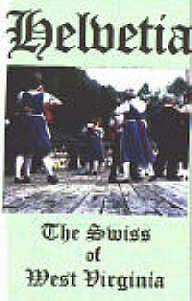Since starting at Augusta, I’ve learned about Helvetia, WV, a fascinating hamlet in the Central part of the state with a vibrant Swiss-German community. In 1869, Swiss-Germans settled in Helvetia, and their descendants have remained there ever since. Swiss language and cultural practices, like cheese making, are celebrated by the town’s residents. During a pandemic-free year, Helvetia holds a variety of traditional festivals and celebrations. Although I haven’t attended any of the festivities, archival recordings of previous Fasnacht (Swiss Winterfest) festivals and interviews with Helvetia residents have given me a little glimpse into the town’s culture.
This fall, I digitized a recording of Helvetians yodeling. I’ll admit that when I first heard the songs, I didn’t really understand what I was hearing. I always associated yodeling with old-fashioned American country music. In the archival recordings, the yodeling was in Swiss and sounded different than yodeling I’d previously heard.
To investigate some of the history of the yodel, I read Timothy E. Wise’s Yodeling and Meaning in American Music. I learned that yodeling was practiced in Europe as early as the 16th century. Yodeling made its way into the United States centuries later. Female opera singers helped popularize yodeling in the US in the early 1800s. Additionally, yodeling was diffused in the US through traveling minstrel shows, which used the yodel to stereotype African Americans. It was furthered popularized in the 1930s country-western music, which helped me contextualize my prior understanding of yodeling. Furthermore, African Americans and Hawaiians incorporated forms of yodeling into their music, which further spread the yodel throughout the US.
In Alpine Europe, yodeling was a form of entertainment and was also used by herders to call their stock. Swiss and Tyrol families, most notably the Rainers, traveled around Europe in the 19th century and facilitated the rise of yodeling. The word “yodel” derives from the German word “jodeln,” meaning to call, cry and sing. Perhaps because of its connection to herding or the European mountain region, yodeling is often used to signify romanticized pastoral scenes. Although I connected it to country music, it seems like many people associate yodeling with the Alpine region because of the way the word sounds and its commercial connection to the region (For example: yodeling in the Sound of Music).
Knowing its connection to the Swiss farms and mountains, I can see how yodeling was able to thrive in Helvetia. Many Helvetians live and work on the family farms in the mountains of Central West Virginia. The isolation of the town was one of the reasons Swiss culture and language were able to flourish.
With this blog, I’m releasing a clip from the archival tape that got me thinking about yodeling. In this audio snippet, Vernon and Norman Burky, Helvetia residents, yodel in Swiss. The Burkys are singing “Hi Lee, Hi Low,” a yodel with German roots that made its way into the US in the 1820s. In the US, the song remained popular until the 1930s, but within Helvetia, it is still sung. The song highlights the joys of rural life, exemplifying the yodel’s connection to rural Switzerland. Tomorrow, Saturday the 9th, I’ll be playing more of the Burkys’ music along with old-time tunes at my virtual event.

